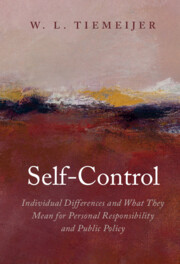 Self-Control
Self-Control from Part I - Self-Control
Published online by Cambridge University Press: 20 August 2022
This chapter turns to the motivation to exert self-control. There is a crucial difference between being unable and being unwilling to exercise self-control. It is a grave mistake to confound the two, as many psychologists and behavioral economists do. In this chapter, I argue that the motivation to exert self-control derives from one’s overall time orientation: One’s general propensity to be moved and motivated by either immediate or future rewards (as indexed by one’s “delay discounting rate”). I show how differences in time orientation are correlated with differences in working memory capacity, and discuss two recent bodies of research that are particularly relevant: the psychology of “mental time travel” and “life history theory.” The conclusion is that people who grow up in harsh and unpredictable circumstances are more likely to develop a present-oriented personality, and thus tend to be less motivated to exert self-control.
To save this book to your Kindle, first ensure no-reply@cambridge.org is added to your Approved Personal Document E-mail List under your Personal Document Settings on the Manage Your Content and Devices page of your Amazon account. Then enter the ‘name’ part of your Kindle email address below. Find out more about saving to your Kindle.
Note you can select to save to either the @free.kindle.com or @kindle.com variations. ‘@free.kindle.com’ emails are free but can only be saved to your device when it is connected to wi-fi. ‘@kindle.com’ emails can be delivered even when you are not connected to wi-fi, but note that service fees apply.
Find out more about the Kindle Personal Document Service.
To save content items to your account, please confirm that you agree to abide by our usage policies. If this is the first time you use this feature, you will be asked to authorise Cambridge Core to connect with your account. Find out more about saving content to Dropbox.
To save content items to your account, please confirm that you agree to abide by our usage policies. If this is the first time you use this feature, you will be asked to authorise Cambridge Core to connect with your account. Find out more about saving content to Google Drive.